AvL Motion, Exobotic, InsightTRAC, Naïo and Nexus finalists for Ag Robot of the Year 2023

The AvL Motion Compact S9000, Exobotic Technologies Land-A2, InsightTRAC Rover, Naïo Jo and Nexus Robotics La Chèvre robots are the finalists for the first-ever global Ag Robot of the Year award. An expert jury selected them from 16 candidates.
Five outdoor field and harvest robots that crop growers can buy or rent in 2023, have made it to the finals of the first ever global Ag Robot of the Year election. They were selected by four Future Farming editors involved with field robots and autonomous vehicles and a researcher of robotics and precision agriculture from Wageningen University & Research (WUR). Geert Hekkert (Editor in Chief), editors Maxence Guillaumot, René Koerhuis and Mick Roberts and Bram Veldhuisen (researcher), each evaluated 16 candidates for the award. These 16 candidates, field and harvest robots that were added to Future Farming’s buying guide after 1 November 2022, automatically qualified for the Ag Robot of the Year 2023 award.
The jury members judged in what way the candidates are able to provide the most added value (return on investment) for growers worldwide and help with a more planet-friendly or sustainable way of growing outdoor crops. Their judgements resulted in the following five finalists in alphabetical order.
This robot selectively harvests fully autonomous by following the bed and detecting asparagus without touching the bed. It requires one operator to among others turn the robot at the end of each row. It has a 25 kW diesel engine and a generator to supply electricity. The maximum harvesting speed is 3.6 km/h and the speed control is adaptive, depending on the number of speers to be harvested. The robot is for sale in a limited number of European countries from €400,000.
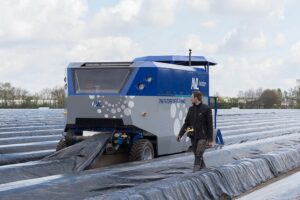
The Land-A2 is a multipurpose tool carrier with a patent pending modular design that allows it to be configured easily for multiple applications while still keeping its payload body balanced out on rough terrain. It uses a battery plug system for fast and easy in field battery replacement and has a 4×4 electric drivetrain. The robot is available in a limited number of European countries starting from €50,000.
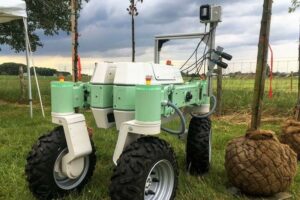
This autonomous rover travels through almond orchards, identifies mummies, and safely removes them with biodegradable pellets to eliminate pests like the navel orange worm who burrow inside of the mummies in wintertime. The Rover robot is fully autonomous and can remove a mummy in under a second. It is a fully electric machine with two batteries and an on-board diesel generator that can supply extra power. available in the US and Australia from US $210,000.
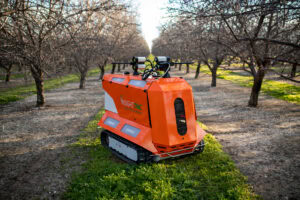
Jo is a compact tracked robot designed for narrow and hilly vineyards. It has a potential for other specialised crops like trees, seedlings, orchards and can work outdoors, but also in greenhouses. The robot is battery powered and has two electrically driven tracks. Its standard implement linkage is brought by a French specialised company in soil cultivation and weed management. Jo is available worldwide for prices starting at €100,000.

This field robot is capable of removing weeds from many different crops while operating 24 hours a day. It is able to recognise crops at all stages of growth and uses cameras and a neural network to differentiate between weeds and crops. It is battery powered (charged by a diesel generator) and has an electric drive system and it can be as productive as 5 field workers pulling weeds. ‘The goat’ is available in North America for US $500,000 or for US $50,000 per growing season.
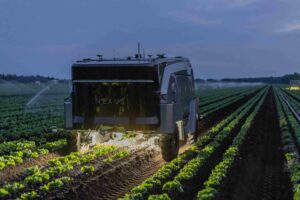
Farmers to choose the winner
The five finalists will be judged by the above-mentioned Future Farming and WUR experts, by Laurent De Buyer (general manager of French branch organisation Axema) and by these prominent farmers and dealers from different parts of the world:
· Chuck Baresich (distributor, Canada)
· Ian Beecher-Jones (wine grower, UK)
· Walter Kihm (arable farmer, France & Ukraine)
· Gerrit Kurstjens (arable farmer, Australia)
· Frederico Logemann (arable farmer, Brazil)
· Michael Nichols (arable farmer, Australia)
· Steve Pitstick (arable farmer, USA)
This jury will pay particular attention to practical applicability and added value for farming practices. At the end of this article, the jury members are introduced in more detail.
About the Ag Robot of the Year award
With the new Ag Robot of the Year award, the initiators aim to support farmers worldwide in choosing the right type of robot for their farming operation. The winners will be announced at World FIRA taking place from 7 to 9 February 2023 in Toulouse/Auzeville-Tolosane (France).
Meet the judges
Gerrit Kurstjens
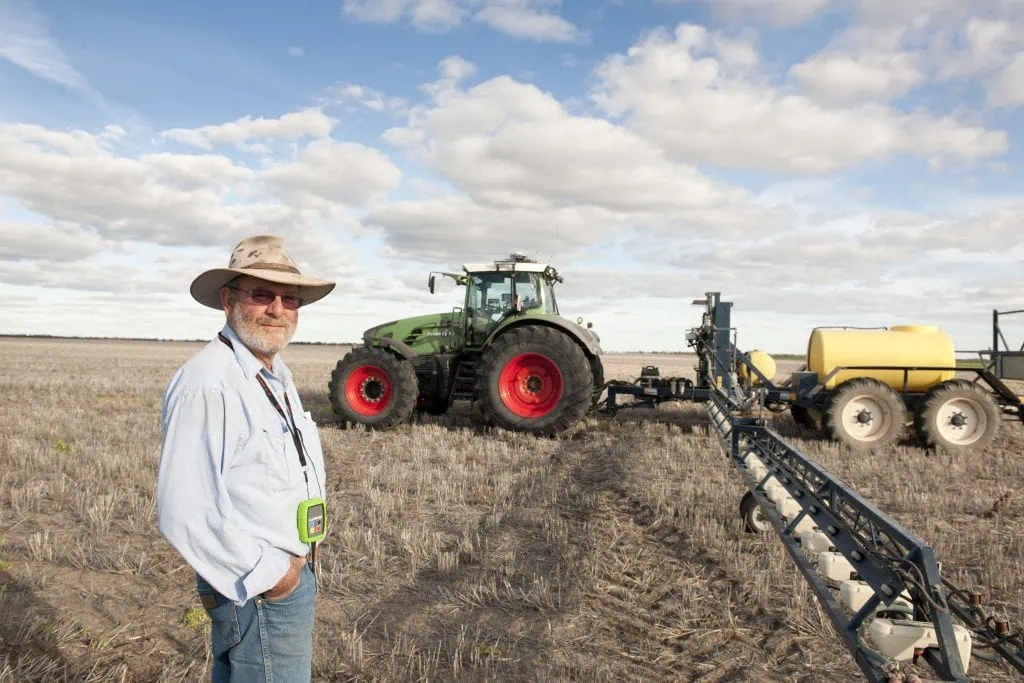
Gerrit Kurstjens is a pioneering farmer who has already clocked up 40,000 ha of autonomous operations with tractors on 13,000 ha of cropping area at Beefwood Farms, Moree in New South Wales, Australia.
Chuck Baresich
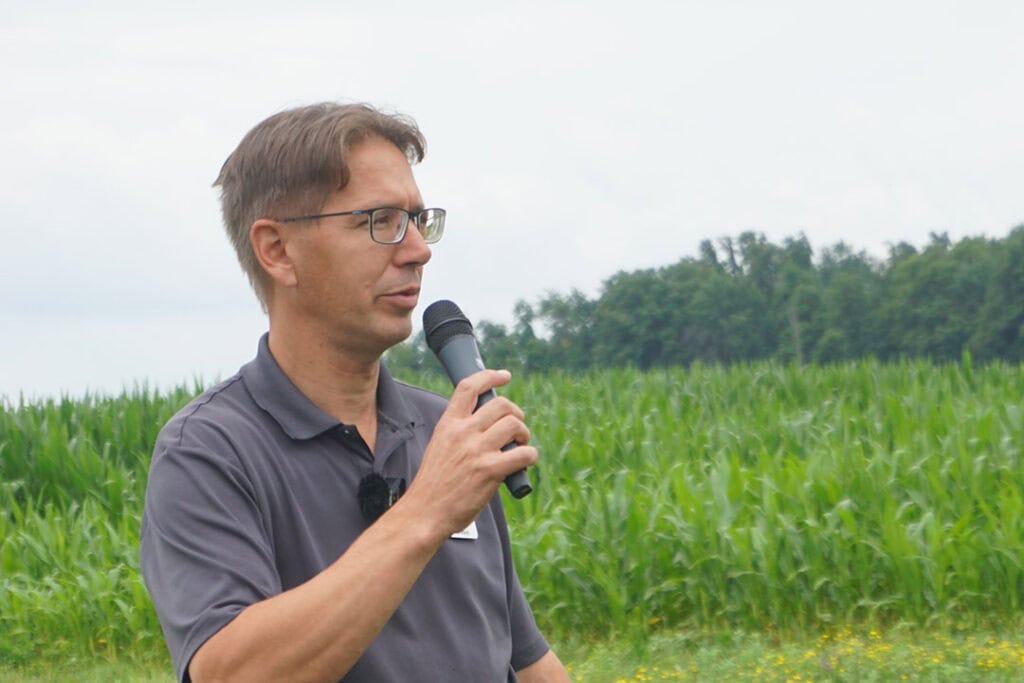
Chuck Baresich is the general manager of Haggerty Creek, the Ontario agribusiness and robotic equipment dealer and a driving force behind a local robotics research project.
Walter Kihm

Walter Kihm is the 8th generation of farmers in his family. He has been working on his family farm in France at Rochefort sur la côte since 2017. The farm consists of 700 ha. Since 2018 they produce organic crops such as chickpeas, wheat, sunflowers and red peas. In 2016 they started a farm in Ukraine with 21 000 ha of conventional farming.
Laurent de Buyer
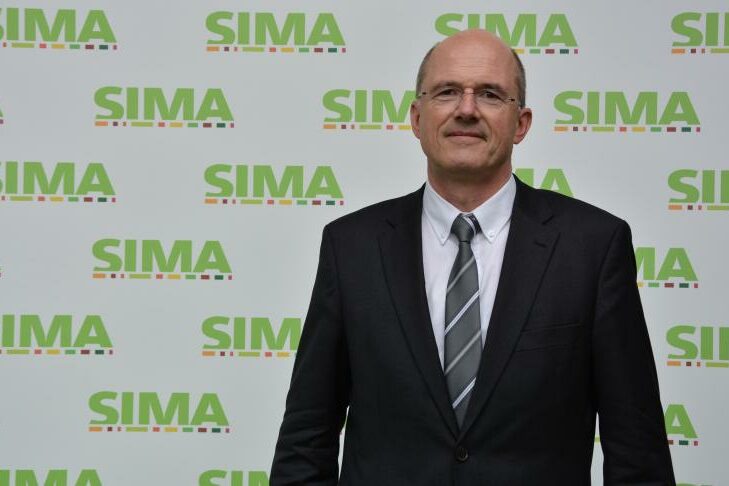
Laurent lives in Paris 14ème. His current position is AXEMA Générale Manager since June 2022. Laurent has always worked in agricultural engineering from the start of his career. Over the past decades, he has worked as a general manager at French manufacturers such as Gregoire (tillage implements), Lucas G (feed mixers), Tecnoma EXEL Group (sprayers) and Manip M-Extend Group (loaders).
Ian Beecher-Jones
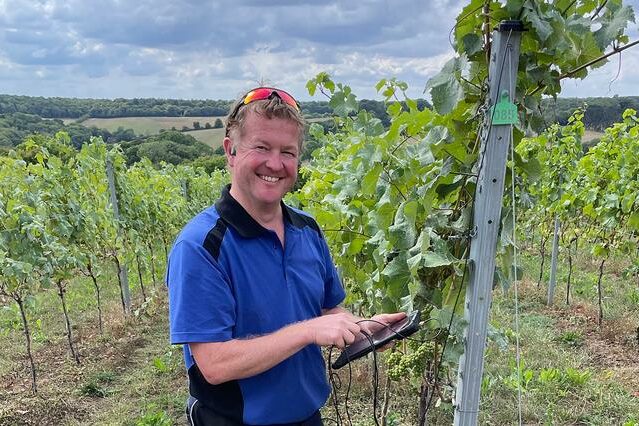
Ian Beecher-Jones has been involved with precision agriculture for the last 20 years, providing consultancy services for multi-national manufacturers around the world. Ian is also a co-owner of JoJo’s Vineyard a 2,2 ha vineyard in South Oxfordshire. The vineyard has recently won an Innovate UK project to explore the opportunities for the digitisation of vineyards using robots, drones and a range of sensing and scanning tools.
Steve Pitstick
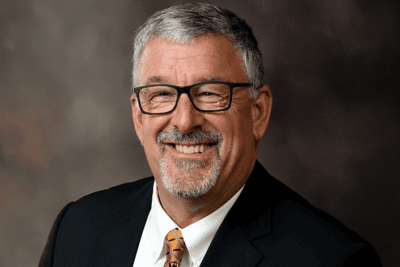
Steve farms with his son. They grow corn and soybeans on about 5000 acres in IL near Chicago. Steve is also the current Chairman of the IL Soybean Association. He has consulted on many agtech matters over the last 10 years and has a close friendship with an individual that is in the autonomous startup space.
Frederico Logemann
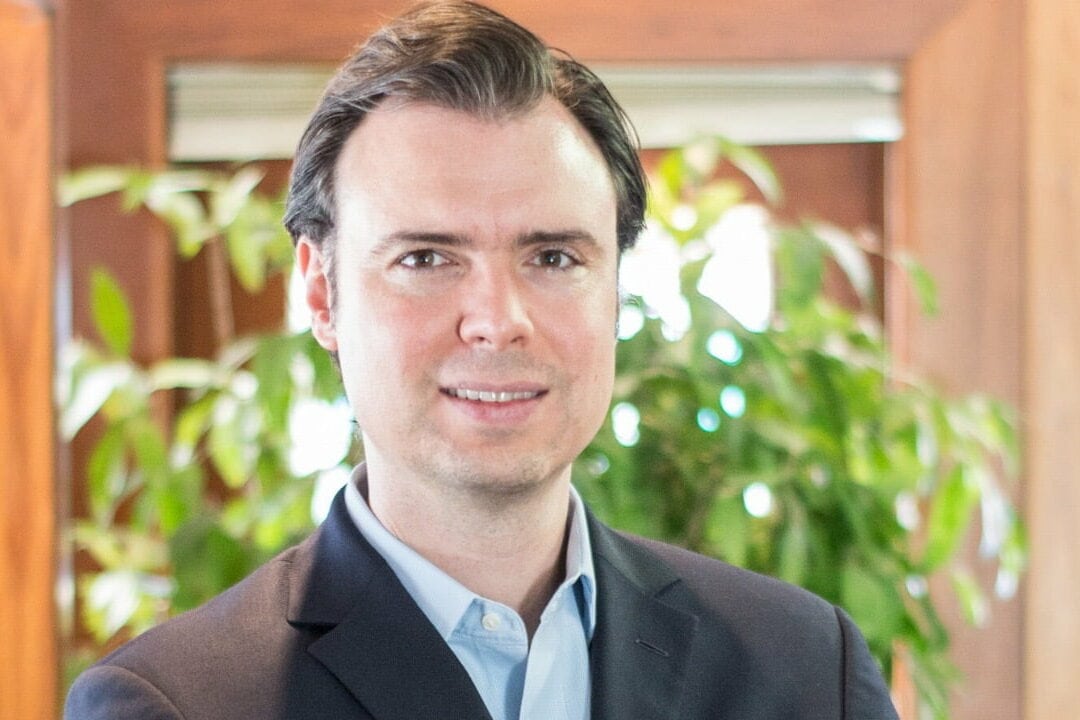
Frederico is head of innovation & strategy at SLC since 2006. SLC is a farm in Brazil for research, development, and education. Frederico was responsible for establishing the company´s innovation department, which is comprised today of an entrepreneurship program, a startup connection program, and SLC Ventures, a venture capital arm. Frederico is also a member of the Board at Instituto Caldeira, an innovation hub for Rio Grande do Sul state.
Michael Nichols
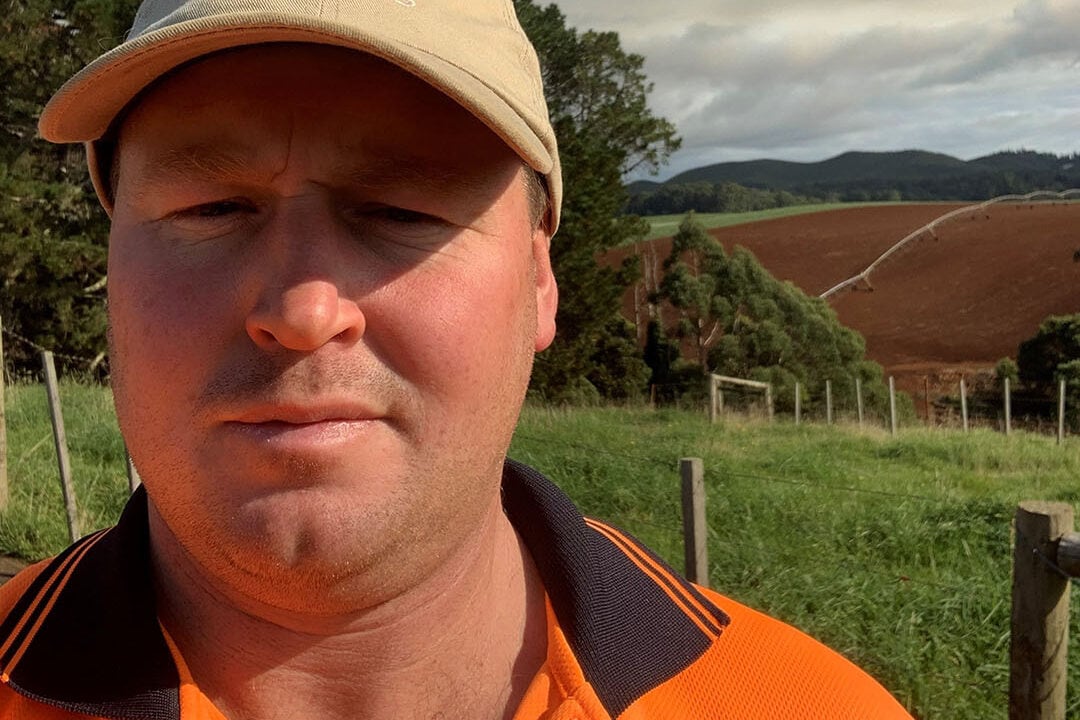
Michael Nichols runs a mixed farming business in sisters creek, Tasmania. They grow a variety of crops like potatoes, onions, poppies, pyrethrum, wheat, barley, mustard and corn. Additionally, they run a few beef cattle on the side. In 2021 his farm won the national Australian government innovation in agriculture land management award.
Maxence Guillaumot

Maxence Guillaumot comes from a French arable farming family. After starting his career in the development of agricultural tractors, he joined an agricultural robotic company, as a robotics advisor. Now, he helps AgTech companies and growers to build the agriculture of tomorrow, as a product and market analyst. He also writes and films about robots for Future Farming.
Bram Veldhuisen
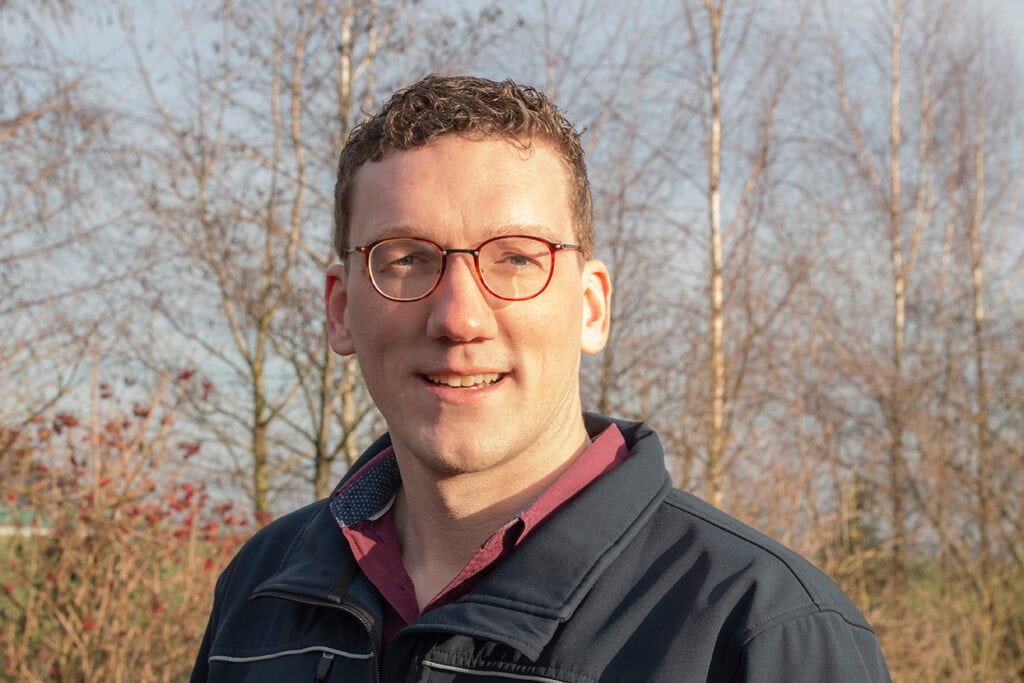
Bram is a researcher in precision agriculture and robotics at Wageningen University & Research (WUR). Besides that, he is closely involved with Farm of the Future, a Dutch initiative in which WUR and Dutch farmers of the future are working together on feasible solutions to the challenges faced by agriculture in the Netherlands.
René Koerhuis
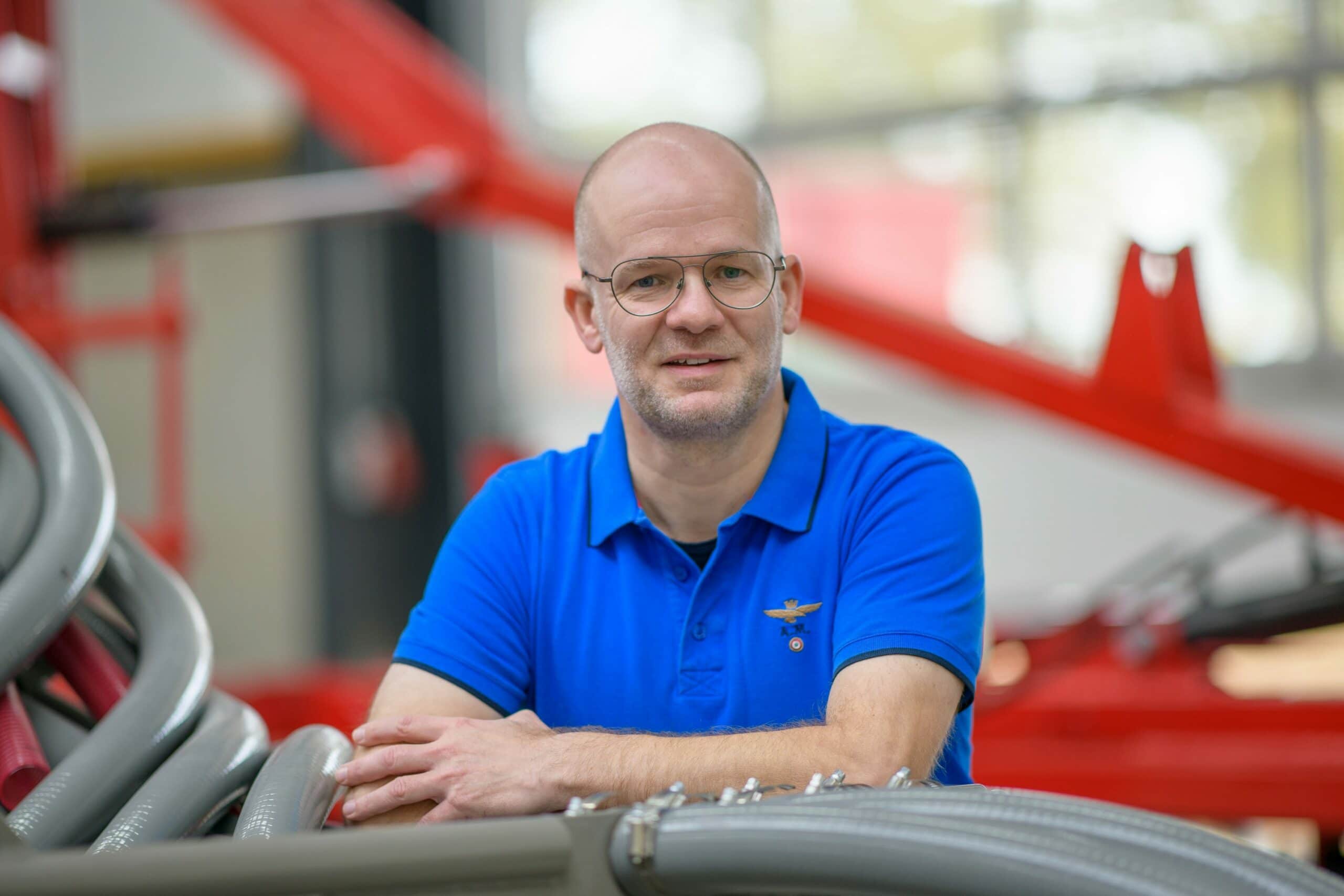
René Koerhuis graduated from Wageningen University & Research in 1998. He started out his career as a ‘Precision Farming Specialist’ at a well-known machine manufacturer. Following that, he fulfilled several product management and marketing roles for different companies after which he started his own company early 2013. He currently is an editor for several titles and websites and specialises in precision agriculture and robotics.
Mick Roberts
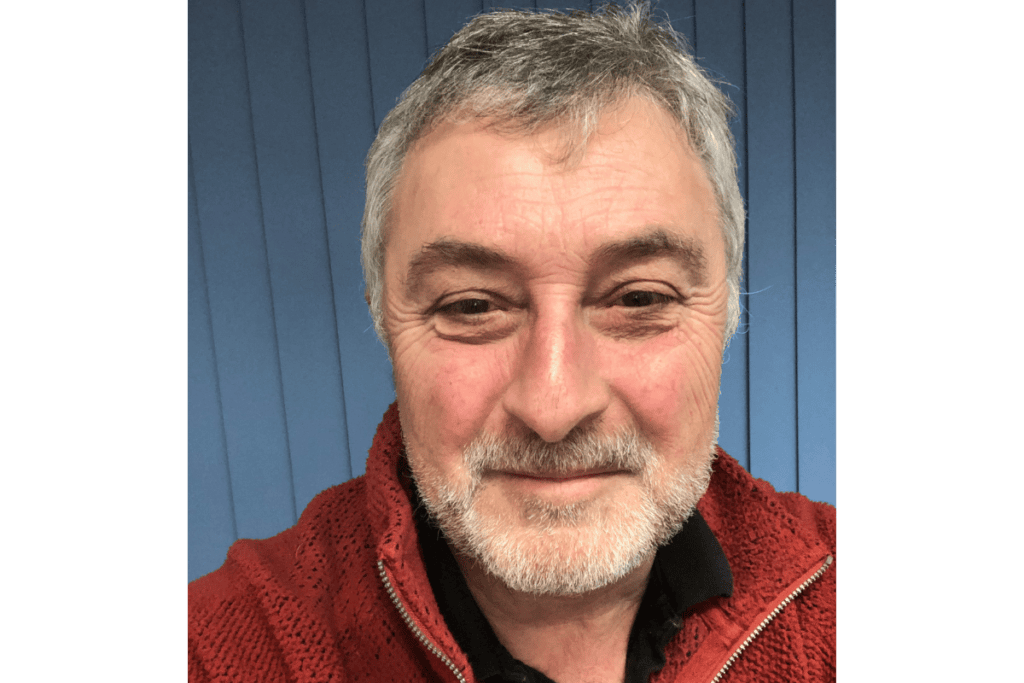
Mick Roberts is an agricultural journalist specialising in spray application technology, drones and precision farming. He edits Pro Operator magazine as well as www.eioperator.com a spraying information and training website.
Geert Hekkert

Geert Hekkert has been editor-in-chief of Future Farming since 2019. Before that, he was editor-in-chief of Boerderij, the largest independent magazine for farmers in the Netherlands. He also founded the National Fieldlab for Precision Farming (NPPL) project in 2017. In this project, farmers work closely with researchers at Wageningen University to test new technology in practice.
Join 17,000+ subscribers
Subscribe to our newsletter to stay updated about all the need-to-know content in the agricultural sector, two times a week.



